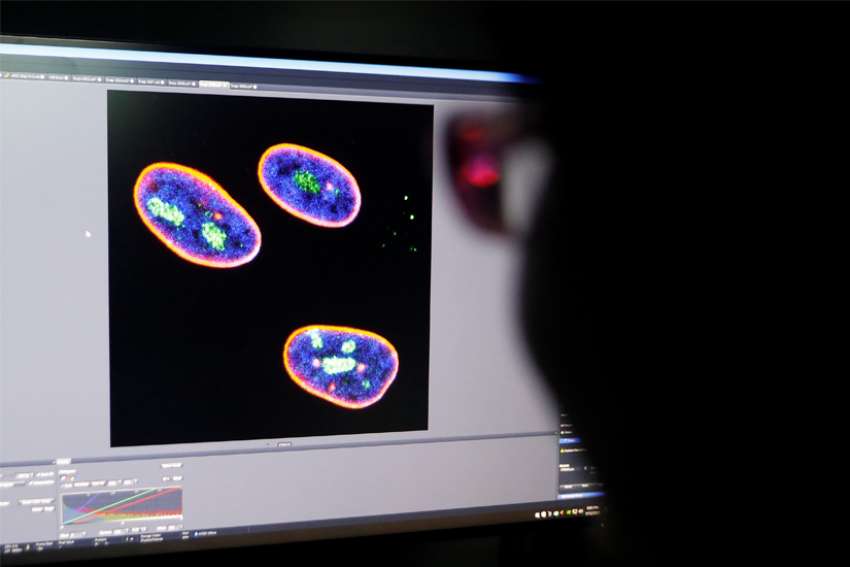“As happens so often in human affairs, opening the door on a controversial but somewhat defensible position (not from the Church’s point of view though) bumps up against a boundary which is first deemed arbitrary and then seen as limiting true science. So the push is on to expand the pool of available research material,” Redemptorist bioethicist Fr. Mark Miller told The Catholic Register in an e-mail.
On May 26 the International Society for Stem Cell Research said it was relaxing the 14-day rule, which prohibited experiments on human embryos past 14 days of development in the lab. Rather than replace or extend the limit, the ISSCR now believes studies proposing to grow human embryos beyond two weeks should be considered on a case-by-case basis, subject to several phases of review.
Up to 14 days, a human blastocyst (the earliest stage of fetal development) consists almost entirely of pluripotent cells — cells that could develop into the constitutive elements of any organ in the human body. Beyond 14 days, the fetus becomes more complex and cells begin to acquire the specific attributes of the organs they will become.
Following a decade-long Royal Commission on New Reproductive Technologies, Ottawa passed the Assisted Human Reproduction Act in 2004, which says, “No person shall knowingly … maintain an embryo outside the body of a female person after the 14th day of its development following fertilization or creation, excluding any time during which its development has been suspended.”
Blowing past the 14-day limit opens up a pandora’s box of ethical challenges, said Archdiocese of Toronto research director Suzanne Scorsone. Scorsone was a commissioner on the Royal Commission in the 1990s.
“You are dealing with the attempted re-opening of an utterly huge subject,” she said in an e-mail. “The difficulty of distinguishing pure research from commercial applications is very much at the core of the issues.”
Society has a legitimate role in regulating scientific research, Scorsone said.
“There will always be some people who will be trying to push the boundaries for their own interests, aware or unaware that they are pushing beyond what is for the common good or in keeping with human dignity,” she said. “... wider society does have to oversee and set the terms in law for doing this.”
Scientists themselves recognize and welcome outside scrutiny, Jesuit geneticist and microbiologist Fr. Rob Allore said.
“Scientific developments do often run ahead of the public discourse,” Allore wrote in an e-mail. “Many scientists today believe it is important to find meaningful ways to include the wider public in the discourse around various research practices.”
While the Church has maintained opposition to in-vitro fertilization and experimentation on the developing human fetus, what limits should be placed on science and how to enforce them have been live issues since culturing humans in labs became possible in the 1970s. Human embryonic stem cell research began in the 1990s. Dolly the sheep was cloned in 1996. CRISPR technology for reading gene sequences began in 2005, but the possibilities became much more apparent in 2013 with CRISPR-Cas9 genome-editing technology. (CRISPR stands for Clustered Regularly Interspaced Short Palindromic Repeats, a way of describing how gene sequences can be read).
Recent experimentation that has cultured lab-grown monkey embryos for up to 20 days and the possibility of creating human-monkey chimeras (beings that contain genetic codes from two different species) has further pushed the envelope on embryonic stem cell research.
“It would be untrue to suggest that there is only one opinion among scientists on this issue,” said Allore.
The Church’s opposition to all forms of lab-made human fetuses should not mean that there is no Catholic voice on this developing science, according to Allore.
“The Church has, generally, been interested in having a creative role in conversations about research involving human subjects and human biological material. This interest extends to the discourse around in-vitro fertilization and stem cell technologies,” he said. “It is not true that scientific research requires that any and all experimental procedures must be permitted. … Engagement with the wider public is a necessary feature of a healthy atmosphere for research.”
Allore points out that the promise of therapeutic breakthroughs using fetal stem cells never materialized, while research on more accessible adult stem cells has produced results.
“The argument that there is only one good way to approach research in a particular field is clearly a false one,” he said.
The role of the Church will be to focus debate on some basic questions, said Miller.
“What or who are you performing your experiments on?” he asks. “There will be some interesting answers, like ‘pre-human life,’ ‘developing human life,’ but no reference to the individual and the sanctity of life.”
Miller wants to know whether research on lab-cultured human fetuses beyond 14 days is “really aimed at greater knowledge or alleviation of issues around pregnancy and birth? Or is there something more specific and possibly more lucrative if discoveries lead to patented procedures? In short, is it a fishing trip?”
As far as he can see, breaking the 14-day barrier “is one more example of human beings and human lives being dismissed because they are worth more under the microscope of a researcher.”

